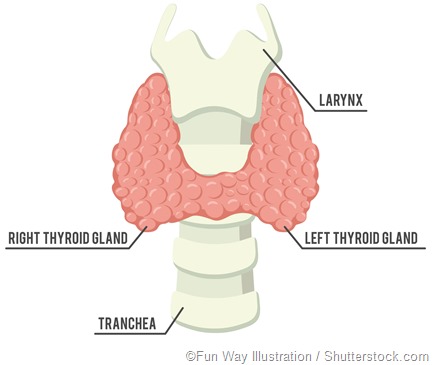An overactive thyroid results in the excessive production of thyroid hormone. This disorder is called hyperthyroidism. The thyroid gland is located at the front of the neck, and is a master gland within the endocrine system - it regulates most of the vital functions in one or other way. For example, the thyroid plays a key role in energy metabolism.
An overactive thyroid can produce several characteristic symptoms, such as hand tremors, racing heartbeat, a high blood pressure, increased appetite, decreased sleep, or weight loss. All these symptoms may not be present at the same time, but any of them should alert the person to the need for evaluation.
Tremor characteristics
Hyperthyroidism is a condition in which the metabolic balance of the body is up regulated, resulting in increased energy production by every cell of the body. As a result, the nervous stimuli become excessive, resulting in hand tremor.
The shaking may be barely noticeable, or it may be so exaggerated that it is impossible to carry a vessel containing fluid without spilling it. The intensity of tremor depends on the general excitability of the nerves, which correlates with the body condition, as well as the degree to which the thyroid hormone production is increased.
Hyperthyroidism is more common in women than in men by a factor of 2 to 10. A tremor may be more likely to be due to an overactive thyroid if any of the following risk factors are present:
- Family history of thyroid disease
- Type 1 diabetes mellitus
- Pernicious anemia
- Primary adrenal insufficiency
- Excessive dietary iodine such as by eating large amounts of kelp (seaweed), either as a vegetable or in the form of a supplement, or by taking medications that have iodine in them
- Age older than 60 years
- Female gender
- History of pregnancy within the last 6 months
Excessive iodine consumption leads to increased uptake of the element by the thyroid gland in many cases. Iodine is incorporated into the thyroid hormone, with the result that increased iodine consumption eventually leads to high thyroid hormone levels.
Women with impaired fertility often have suboptimal thyroid function, and thyroid testing may point to the need for treatment of the hypothyroid condition.
In a few individuals, the raised level of thyroid hormones is due to drug interaction between the various drugs being used on a chronic basis. Thus any new drug should be introduced only under medical advice and supervision.
Thyroid overactivity also leads to worsening of all other types of tremor as well.
Mechanism
The thyroid hormones (thyroxine and triiodothyronine) increase the excitability of the nerve cells in the oscillatory loops of the central and peripheral nervous systems. This is by increasing the number of calcium channels and beta-adrenergic receptors formed in response to calcium channels in all cells capable of excitation.
Oscillatory tremor is caused by reflexes originating in the afferent muscle pathways. This increases the amplitude of the tremor above the normal fine oscillation, by producing a synchronized tremor.
Diagnosis
To trace the origin of a tremor to thyroid overactivity, a complete medical history must be taken, along with a physical examination for signs of thyroid enlargement and hyperfunction. Along with these, measurement of the blood levels of thyroid hormones is advised and is extremely useful to establish the diagnosis.
These are called thyroid function tests, and are performed in the great majority of tremor patients. This involves testing the blood levels of thyroid stimulating hormone (TSH), the thyroid hormones T3 and T4, and free T3, free T4 levels.
If thyroid nodules are present or if the hormone levels are extremely abnormal, imaging of the thyroid gland is often undertaken to further characterize the disease condition. Ultrasound, CT, or MRI imaging may be ordered depending on the clinical and laboratory parameters.
Treatment of tremor
Patient age, the existence of other medical conditions, the acceptability of the mode of treatment, and the availability of good thyroid surgeons, all affect the choice of treatment.
The tremor induced by an overactive thyroid responds to appropriate treatment of the underlying condition. Thus medical treatment in the form of anti-thyroid drugs may be sufficient. Depending on the indications, surgery or radioablation of the thyroid may be advised for some patients. Treatment is important because the chronic effects of thyroid over activity are significant.
References
- http://www.mayoclinic.org/diseases-conditions/hyperthyroidism/basics/preparing-for-your-appointment/con-20020986
- http://www.clevelandclinicmeded.com/medicalpubs/diseasemanagement/neurology/tremors/
- https://www.ncbi.nlm.nih.gov/pmc/articles/PMC4297626/
- https://medlineplus.gov/ency/article/000356.htm
- https://www.womenshealth.gov/publications/our-publications/fact-sheet/graves-disease.html
Further Reading
Last Updated: Feb 26, 2019